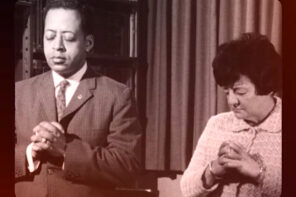“There are no two ways about it. To understand the significance of this title requires some self-disclosure. Since the Islamic intellectual discourse has such a poor historical record of women’s self-disclosure in the name of Islam, it is even more appropriate to admit to the personal as political.
When I returned to the United States after living for three years in Malaysia, where I’d had the opportunity to link my theories about Islamic theology with active social involvement, I encountered the bleakest circumstances. I found pervasive, systematic oppression and the resulting spiritual strain in the lives of ordinary people—causing most to live in utter disregard for their fellow human.
I found this unbearable, so I sought answers and resolutions by reading every kind of source material I could find. There was little consolation. At each juncture, I continued to find more literature focusing on the extent of the problems: psychological, physical, intellectual, social, economic, or political.
In the face of such massive problems, I felt utter despair. How can I despair, I thought; if I have faith? I was indebted to the insights of Paul Tillich:
“For in these days the foundations of the earth do shake. May we not turn our eyes away; may we not close our ears and our mouths! But may we rather see, through the crumbling of the world, the rock of eternity and the salvation which has no end!”
He cited the worldview of the prophets and holy men and women as expressions of the certainty of belonging “within the two spheres, the changeable and the unchangeable… Because, beyond the sphere of destruction, they saw the sphere of salvation; because in the doom of the temporal, they saw the manifestation of the Eternal”
In Islamic literature I hoped I would also find a cogent and viable spiritual system that linked the mystical and intellectual musings to what I was experiencing as a daily reality. The significance of Tillich’s work was its expression in response to the moral/spiritual dilemmas of modern circumstances. I ran up against a scarcity of information in response to such dilemmas from modern Muslim thinkers. They were obsessed with the realpolitik (everything was power, authority, and control) through the medium of legal operations. I feel little hope for the future of Islam or the planet when only articulated in terms of Muslims gaining more global control, instead of the dominating U.S superpower and her western allies. Fantastic as it really is. I think such an outcome would still leave a gaping spiritual void.
I have little confidence that Muslims gaining more political power to control the world would really make a better life for all the oppressed and exploited people of the world. I see very little from our current political leaders that would give me such confidence. What little I do see is marginalized by those who are wielding the greatest power.
One reason for my lack of confidence is simply that the agendas expressed by Muslim political and intellectual elites are primarily top-down operations. They seem more focused on the role of legalized authority to assert unilateral power and control over the will and status of the people at the bottom. This removal from the masses, in all their diversity, speaks little towards my hope of the common human well-being.
At the level of a mass movement, we surely need new voices and new agendas. When re-reading the inspirational words of past Muslim mystics, I encountered beautiful discourses on the qualities of spiritual realization. Sadly, I found little or no social reality expressed as a component of that realization. Does this mean that a spiritually qualitative life is unconnected to social realities? It cannot be that one is meant to feel connected to the Creator with no creature-to-creature interaction in activating that connectivity.”
These journal notes were written almost 20 years ago. I am struck by their simplicity and by my naïveté of believing in such a possibility. I guess I was just inspired by my own vision of “Islam.” Activating the spiritual core at the level of policy and social affairs seems more elusive today than at the time of that writing.
As time passes and I continue to transition within Islam; away from historical and cultural patterns of (just) Muslims and towards a more pluralistic perspective of Islam, focused on the human relationship with the sacred ultimate principles. It may seem a kind of humanism— but if so it is filtered through the stark reality of being a Muslim female.
And yet still, within Islamic intellectual developments gender discourse remains marginalized, if not completely excluded. This is so not only from the perspective of gender as a fundamental aspect in categories of thought, but also in terms of the powerful example of caring work still attributed primarily to the woman. She works not only for the sake of self and others, but also as an example of humanity in agency with the Ultimate: applying the divine principles. I am still hopeful that our examples, as women, will represent the ways for achieving a world order removed from the entrenched patterns and diverse forms of patriarchy.
I am reminded of the hadith by the Prophet Muhammad. Indeed your Lord has certain rights over you, and your ahl (family/community) has certain rights over you and your nafs (soul, self, person) has certain rights over you. So give each, the rights that they are due.” I look at this also as a triad. The way to fulfill our rights to our Lord, Allah, is to balance the way we complete the fulfillment of rights to our own selves, and to the living communities of humankind.
Ahl means family, and is used for the human family or for larger communities in many places in the Qur’an, and not just for ones blood family. Women are often socialized to defer their own rights in service to others, their immediate family especially. It is almost as if what it means to be a woman, a mother, etc., is to be in service of the needs of others. This service to or care for others is a good thing. So good in fact, everyone should be rushing to do it, not just women.
Likewise, caring for oneself has to be put in perspective to the whole. We do a disservice to our Lord and to humankind when we leave ourselves out of the formula of care. I spent a lot of time in the past five years reading about the crisis in care work. In this ethical formula, unless the human inhabitants of the planet make a new assessment of what it means to be human, and what it is to act humanely namely to address the matter of care, we will self destruct. Care work can be done for free, out of love and concern or it can be done for money. It is not enough that the very wealthy have better access to care because they can pay for it.
The active Islamic principle is the one where others can live in a life of such quality as we want for ourselves. That is the golden rule and I am still waiting for it to be the rule we live by instead of living by some one’s rule(s).




